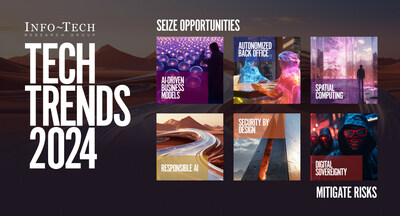Tech Trends 2024 Report: Six Trends of the Generative Enterprise Revealed by Info-Tech Research Group
Press Releases
Oct 11, 2023
Tech Trends 2024 Report by Info-Tech Research Group Reveals How Organizations Will Be Approaching AI, Spatial Computing, Security, Digital Sovereignty, and More Over the Coming Year
TORONTO, Oct. 11, 2023 /PRNewswire/ – To prepare technology leaders for what's to come in 2024, global IT research and advisory firm Info-Tech Research Group has released its highly anticipated annual technology report: Tech Trends 2024. As the technological landscape experiences exponential acceleration, as predicted by the enduring legacy of Moore's Law and Gordon Moore's unmatched vision, IT leaders across the globe find themselves navigating both the transformative innovations and the ethical considerations they bring. As the boundaries of technological possibilities expand and the implications become more pronounced, IT faces the dual challenge of harnessing the raw power of emerging technologies and setting the ethical and operational compass for AI's expansive influence. Drawing from a comprehensive survey of IT leaders and experts, the firm's 2024 report highlights six pivotal AI-centric trends, as well as the promises and intricacies of an AI-integrated future.
"Our 2023 report highlighted generative AI as a trend that would impact every industry. Not only was that true, but the impact was tremendous and is still reverberating through society," says Brian Jackson, principal research director and research lead for the 2024 Tech Trends report. "In our Tech Trends 2024 report, we're doing a deep dive into the generative enterprise and examining the full breadth of implications ahead of organizations as a result of generative AI's disruptive effects. There are significant opportunities for technology leaders to consider and seize, including creating new revenue-generating business models or optimizing existing operations. There are also severe risks to mitigate, ranging from new regulatory activity to protecting intellectual property."
The Tech Trends 2024 report is informed by the firm's recent Future of IT survey, which includes data from 848 industry professionals in IT or those directing IT functions. The underlying metrics for the 2024 report are diverse, with insights from 15 countries and regions spanning North and South America, Europe, and the APAC region. Additionally, the perspectives captured encompass 16 industries, including government, professional services, manufacturing, education, healthcare, financial services, telecom, and the retail sector.
"Generative AI is a major inflection point in the era of exponential IT, and CIOs will need to come to grips with what it means for them if they expect to have a seat at the decision-making table," says Jackson. "CIOs stand in the unique position of navigating the new relationship between the organization and AI, and it's up to them to ensure it reaps more benefit than harm."
Exponential IT encompasses the rapid advances in artificial intelligence and machine learning as well as emerging tech trends, digital transformation, and the vital strategies required to thrive in an era of exponential technological evolution. Info-Tech Research Group recently introduced its new Exponential IT Research Center, launched at Info-Tech LIVE 2023 in Las Vegas in September. The firm's exponential IT framework is designed to meet the growing demands of today's enterprises, emphasizing the promotion of a culture where IT is embedded not just as a distinct department but as a central driving force, poised to adopt new technologies, adapt methodologies, and rethink traditional processes.
The survey findings, complemented by exclusive analyst research and expert perspectives, reflect broader market sentiments and are poised to guide CIOs' digital strategy initiatives for 2024. The firm has identified the following six AI-centric tech trends set to define the coming year:
- AI-Driven Business Models – The commercialization of AI models is based on the value of an accurate prediction. Algorithm builders train their neural networks to make good predictions using a significant amount of historical data, sometimes adding human feedback to help solve special circumstances. Once trained, the algorithms can make predictions based on new data. More recently, the technology sector has moved from augmenting its business models with AI predictions to making AI predictions themselves the product.
According to the research, most IT organizations are making plans for AI to drive strategic aspects of their business in 2024. Of companies choosing to invest in AI before the end of 2024, 66% expect AI to positively impact their company, compared to 38% of companies not investing in AI. Only 3% feel they face an existential threat from AI.
AI adopters have said they will use AI in several strategic areas by the end of 2024: 77% for business analytics and intelligence and 71% to identify risks and improve security, while most skeptics won't apply AI in any of these areas. AI will define business strategy by the end of 2024, according to 68% of respondents.
- Autonomized Back Office – IT's role has traditionally been to autonomize business systems by providing capabilities that allow systems to self-execute and self-regulate toward company goals in the name of efficiency. With generative AI, a wide range of new tasks become possible to automate toward this goal. AI models are adaptable and flexible, able to process large volumes of unstructured data and provide classification, editing, summarization, new content creation, and more.
The report reveals that 47% of respondents are keen to adopt new generative AI features from major vendors either in beta access (17%) or when generally available (30%). The other half are still more cautious, with 37% needing more information before deciding and 16% holding off on the features until other organizations test them.
When asked what type of operational tasks organizations are most interested in using AI for, 33% say they already use AI to automate repetitive, low-level tasks, and 45% say they plan to do so in 2024. The research also found a significant commonality between adopters and skeptics – they are both more interested in automating tasks through AI than augmenting operational staff in their decision making.
- Spatial Computing – Spatial computing promises to bridge the digital and physical worlds, allowing users to interact with digital content in the space around them. Moving beyond traditional interfaces like keyboards and mice, spatial computing employs natural interactions such as gestures, voice, and gaze facilitated by devices like augmented reality glasses or virtual reality headsets, as recently introduced by some of the big tech giants.
According to the firm's research, AI adopters are 42% more interested in using a generative AI-based interface than skeptics. About one in five adopters have already invested in mixed reality, whereas only one in 15 skeptics has done so. The report also shows that organizations invested in or planning investment in AI are more likely to be adopters of mixed reality, but most of that investment is still over the horizon after 2024.
While newly released headsets may make waves among early adopters, most will wait and see if mixed reality lives up to the hype. In the meantime, the data indicates they'll explore generative AI interfaces that lead to more spatial computing applications even without headsets.
- Responsible AI – Lawmakers worldwide have typically been slow to respond to emerging technologies. In recent years, there have been various examples of Silicon Valley's "move fast and break things" approach, where a company quickly enters the market and worries about sorting out the situation with lawmakers years after the fact. Fears of AI's misuse or neglect surround its potential to manipulate people's behavior using misinformation, to cause mass unemployment, or even to pose an existential threat to humanity.
Even after laws regulating AI are passed, it will be some time before responsible AI is regulated in an enforceable manner. However, organizations looking to build or deploy AI should mitigate the risk of not meeting compliance requirements later by adopting responsible AI frameworks now.
According to Info-Tech's Future of IT survey, one in three AI adopters say that the CIO will be responsible for the governance of AI. Another 17% say that a committee or work group will be accountable, and another 10% say it's shared between two or more executives – either of these groups could also include the CIO. For one in five adopters, no one is responsible for AI governance yet.
- Security by Design – This trend underscores the integration of security measures right from inception, as opposed to being tacked on as an afterthought. By anticipating vulnerabilities and integrating robust defenses – vital in the AI era with its inherent software complexities – developers can craft software that is intrinsically secure. Historically, the onus of risk mitigation falls on users due to legacy code vulnerabilities, necessitating frequent patches. This reactive approach isn't always sufficient, underscoring the need for organizations to prioritize proactive cybersecurity.
In today's environment, AI brings new threat vectors with familiar themes. Without addressing the problem at its root, enterprises will continue to sink more investment and resources into cybersecurity.
The Tech Trends 2024 report shows that the majority of organizations aim to spend more on cybersecurity in 2024, with more than one in six organizations planning to increase their cybersecurity budget by more than 10%. The top priorities for cybersecurity investment are different for adopters and skeptics. Adopters rate security awareness and training of their own staff as the most critical area to invest in, rating it an importance of 4.3/5 on average. Skeptics see third-party services (such as 24/7 intrusion detection) as the top priority, with a rating of 4.1/5 on average.
- Digital Sovereignty – Digital sovereignty, particularly in the context of data, is becoming increasingly paramount in the age of advanced technologies. As generative AI technologies are trained by scraping the web to compile massive data sets for their models, questions arise about who truly owns, controls, and has rights to that data.
As courts and lawmakers catch up with the new capabilities of generative AI, organizations are questioning how to protect their data and key aspects of their digital identity, incentivizing them to set up infrastructure and deploy protections that preserve their digital sovereignty and prevent third-party AIs from training on their data.
The Tech Trends 2024 report also includes insights in the form of case studies from technology experts at organizations such as SAS, Cognitive Systems Corp., Caravel Law, Arcalogix, IronCore, and the University of Chicago Department of Computer Science's Glaze project.
The new trends report will inform the firm's next major industry release, the upcoming CIO Priorities 2024 report. This resource, set to be published in early 2024, will take a deeper dive into the recommended capabilities that will help organizations respond to each emerging trend.
Download and read the full Tech Trends 2024 report for more insights for the year ahead.
For media inquiries on the topic or interview requests for Brian Jackson, lead author of the 2024 report and an expert on emerging technology trends, please contact [email protected].
Info-Tech Research Group is one of the world's leading information technology research and advisory firms, proudly serving over 30,000 IT professionals. The company produces unbiased and highly relevant research to help CIOs and IT leaders make strategic, timely, and well-informed decisions. For 25 years, Info-Tech has partnered closely with IT teams to provide them with everything they need, from actionable tools to analyst guidance, ensuring they deliver measurable results for their organizations.
Media professionals can register for unrestricted access to research across IT, HR, and software and over 200 IT and industry analysts through the firm's Media Insiders Program. To gain access, contact [email protected].
To learn more about Info-Tech Research Group, visit infotech.com and connect via LinkedIn and X.
![]() View original content to download multimedia:https://www.prnewswire.com/news-releases/tech-trends-2024-report-six-trends-of-the-generative-enterprise-revealed-by-info-tech-research-group-301953844.html
View original content to download multimedia:https://www.prnewswire.com/news-releases/tech-trends-2024-report-six-trends-of-the-generative-enterprise-revealed-by-info-tech-research-group-301953844.html
SOURCE Info-Tech Research Group





